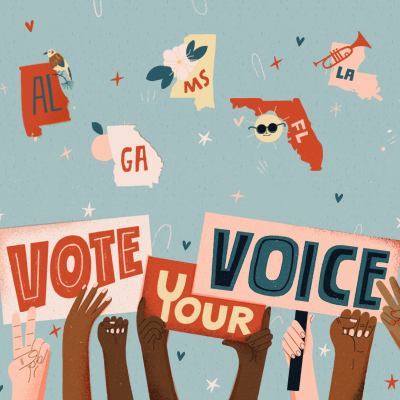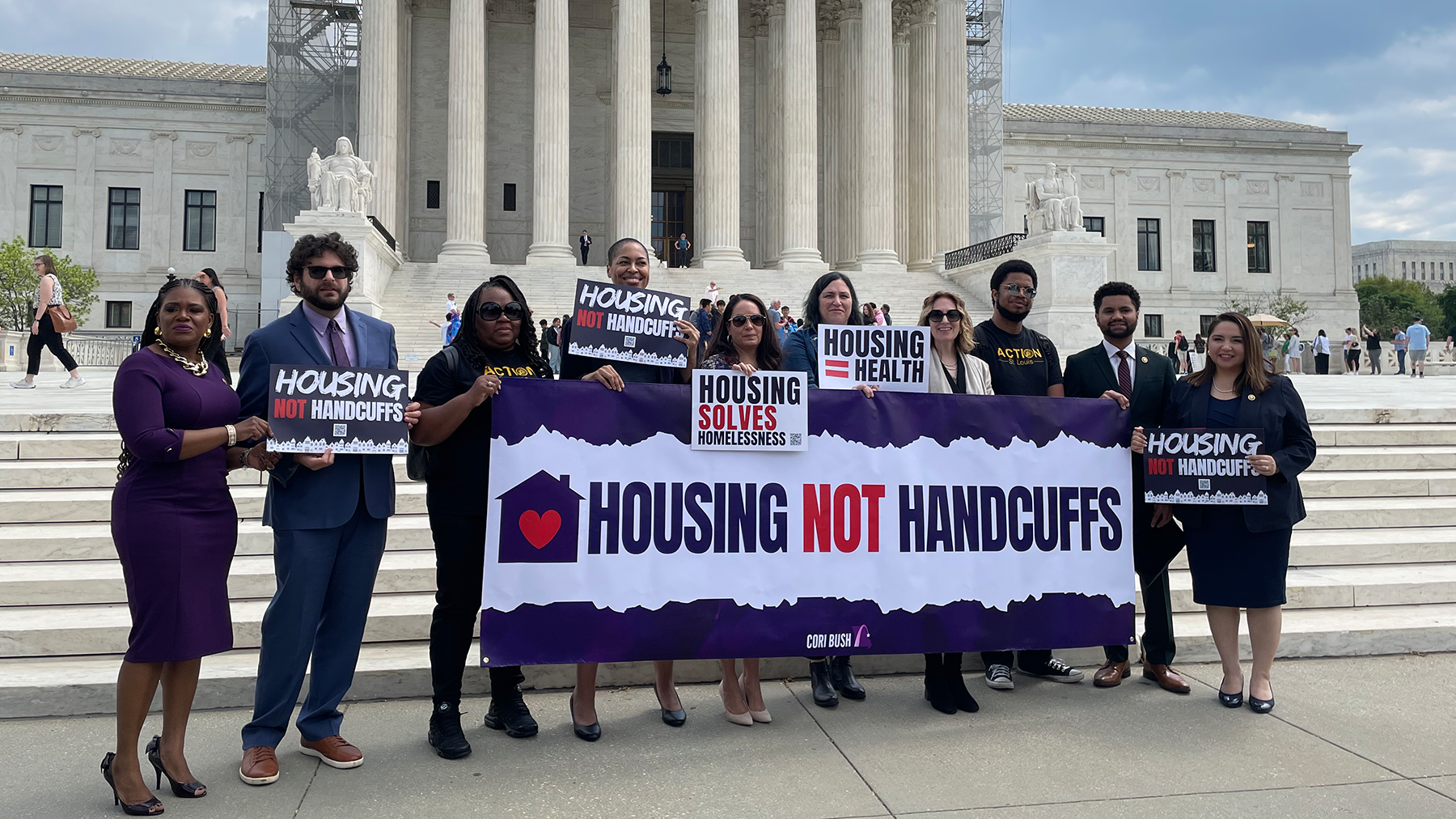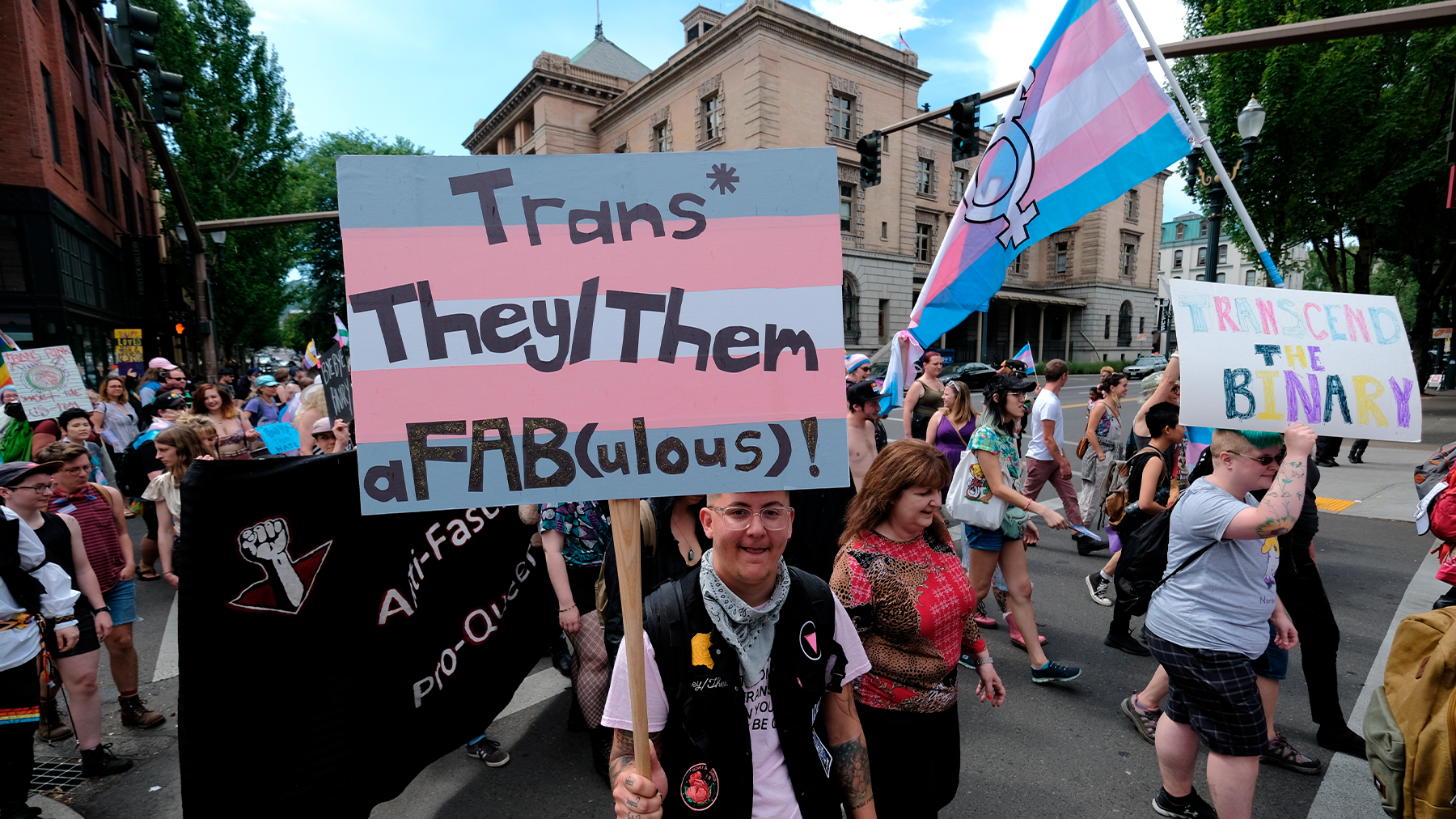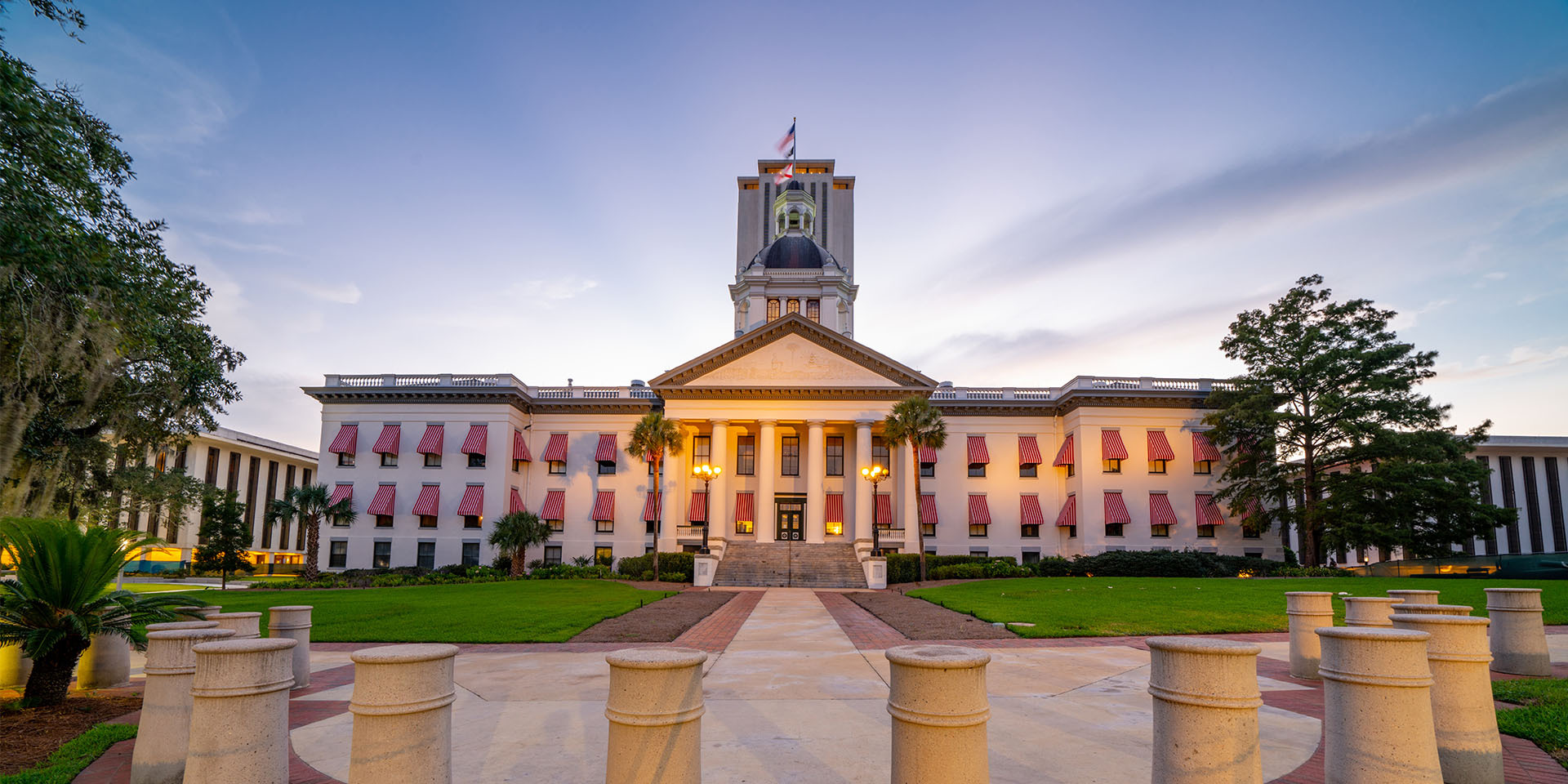The Southern Poverty Law Center (SPLC) is dedicated to safeguarding civil rights and building a more equitable and just society. Rooted in the South, where the legacy of the Civil Rights Movement continues to shape the struggle for racial equity, we partner with communities to dismantle white supremacy and strengthen intersectional movements to advance transformative policies and human rights for all.
Our work includes providing subject-matter expertise and technical assistance to partners, stakeholders, and state and local officials to drive impactful initiatives that ensure a future where Black and Brown communities are not only represented but deeply respected as part of a thriving democracy. We focus on:
- Eradicating Poverty: Protecting Social Safety Net Programs and Pursuing Federal Dollars to Supplement State Budgets
- Ending Over-Criminalization and Mass Incarceration: Transforming Youth Justice
- Strengthening Democracy: Preventing Political Violence and Improving Access and Engagement
- Countering Hate and Extremism: Ensuring Robust and Supportive Education
Strengthening Democracy and Voting Rights
In a true democracy, voting should be a simple, convenient process that allows every eligible voter to participate easily. But too often in Florida, this is not the case. The Florida Legislature’s recent state voting and election law changes significantly hinder voter participation. Changes to vote-by-mail and the voter registration process, extreme regulations on third-party voter registration organizations, and threats posed by the investigative Office of Election Crimes and Security make participation in our electoral process challenging. Following hurricanes or other natural disasters, these deterrents and impediments are worsened by the lack of election administration protocols, which result in closed or moved polling locations, unexpected changes in voters residential addresses, and much more.

Story
Vote Your Voice: Florida Justice Center critical to returning citizens
The FLJC, which since 2019 has conducted more than 1,000 voter eligibility checks for returning citizens was awarded a grant by the SPLC.
Instead of providing ways to increase participation for eligible voters, lawmakers and the governor-appointed secretary of state have criminalized Floridians who are confused or ill-informed about their eligibility status and attempt to comply with voting laws and exercise their rights. At the same time, Florida policymakers continue to attempt to erode the state’s citizen initiative process to restore voting rights of those with completed felony convictions through undemocratic threshold increases and cost-increasing regulations. Furthermore, Florida’s administration damaged its democratic infrastructure when it removed Florida from widely trusted and secure interstate data-sharing agreements (a vital source of information for election officials and routine voter list maintenance).
Florida thrives when every voice is heard and every voting-eligible citizen can fully participate in democracy. Mass disenfranchisement has been used to silence thousands of voices, deny representation and perpetuate inequality. We must end this injustice to strengthen democracy.
The SPLC will advocate for the passage of a comprehensive state voting rights act to make voting more accessible to more people.
Recommendations:
- Authorize automatic and same-day voter registration.
- Allow for permanent vote-by-mail requests with prepaid postage for ballot returns.
- Establish a centralized database for those with past criminal convictions to determine their voter eligibility and outstanding fines, fees and restitution.
- Ensure non-English language access for Florida’s rich diversity of population.
- Codify key provisions from the landmark 1965 Voting Rights Act that have been eroded since Shelby and Brnovich, including preventing vote dilution, strengthening voter intimidation protections, and creating a state “preclearance” program that requires local governments with records of discrimination to prove certain voting changes will not harm voters of color before they can go into effect.
- Allow for the ability to — and advocate for — supervisors of elections to add additional early voting sites to serve their community better.
Dismantling White Supremacy
More than 2,000 memorials in the United States valorize the Confederacy, a secessionist government that waged war to preserve white supremacy and the enslavement of millions of Black people. Erected primarily during the Jim Crow era and Civil Rights Movement as part of an organized propaganda campaign to terrorize African American communities, these artifacts distort the past by promoting a false narrative of the Civil War and continue to divide communities where they stand in public spaces.

Guide
More than 2,000 Confederate memorials can still be found throughout U.S.
The Third Edition of Whose Heritage? report explores the propaganda campaign to promote the “Lost Cause” and what you can do to help remove these symbols.
Since 2017 a significant number of Floridian communities have worked together to successfully remove these hateful reminders — in large cities such as Jacksonville and smaller localities such as Fort Myers. However, in response, some Florida lawmakers have tried to pass laws that increase financial penalties on those who remove or vandalize such statues. Recently, lawmakers filed bills to force cities and counties to replace all Confederate statues removed since 2017 and provide a mechanism for the governor to remove any local elected official who removes one of these memorials. The SPLC strongly opposes these measures which seek to continue oppression and intimidation both symbolically and functionally.
Similarly, as hate crimes continue to rise across the state, we seek to update Florida’s hate crime reporting statutes to require law enforcement agencies to uplift all incidents to the FBI’s National Incident-Based Reporting System (NIBRS). This crucial FBI database is one of the country’s leading and valuable tools for academics, advocates, and government officials; it enables them to track, monitor, and anticipate hate crime incidents in certain localities. Currently, the NIBRS is incomplete and therefore not as useful as it was intended to be. For example, the database currently shows that the City of Orlando reported zero (0) hate crimes in 2023, despite numerous news-media reports of Nazi/antisemitic activity across the Central Florida region. Mandatory hate crime reporting will help future lawmakers craft policies to help address this growing problem.
Recommendations:
- Reject any attempts to subvert the democratic process and undermine local control by forcing communities to keep or restore unwanted memorials and monuments.
- Require law enforcement agencies in Florida to develop a protocol and report all incidents of hate crimes to the FBI’s National Incident-Based Reporting System, annually.
- Unite with local governments to create a grant program to help local communities fund the relocation of Confederate memorials if relocation is required.
Ending Unjust Imprisonment
The prison system’s significant overcrowding and persistent understaffing stems from an extensive history of overly harsh sentencing practices rooted in “tough on crime” attitudes. Mandatory-minimum sentences, once lauded as the only way to combat the burgeoning drug epidemic of the 1970s/1980s, are now widely panned by academics and advocates across the political spectrum as ineffective and harmful. Yet, despite this ample research to the contrary, the Florida Legislature continues to pursue new mandatory-minimum sentences that unfairly burden individuals, their families, and their communities.
The tragic, growing, and ongoing opioid epidemic plaguing towns and cities across the Deep South has helped to fuel lawmakers’ renewed interest in mandatory-minimum sentencing policies. Coupled with existing discrimination in the prosecution and sentencing of people of color for addiction-related crimes, mandatory-minimums seem even that much more extreme.
Policymakers should treat all substance use disorders the same way, as the public health crisis they are. Mass incarceration and perpetual legal trouble are not pathways to recovery or rehabilitation.
Recommendations:
- Repeal and replace all mandatory-minimum sentencing laws with those which allow for judicial discretion and alternative rehabilitation methods.
- Provide equal public health support for all types of substance use disorders.
Ending Unjust Imprisonment
In Florida, police can arrest children as young as 7 years old. Children of color account for 62% of children arrested in Florida; shockingly, 78% of those children of color are prosecuted as adults. Florida is an outlier nationally, prosecuting more children as adults for felonies than any other state — often at thesole discretion of prosecutors. Direct file transfers, which force children to be prosecuted in adult court and detained in adult facilities, happen 63.2% of the time for Black youth, compared to 22.7% for white youth. Incarcerating a child in Florida for one year ($130,520) is more expensive than the alternatives combined: the annual cost to educate a child in Florida public schools is $11,773; it costs $3,427 to fund alternatives to incarceration; and enrollment is $23,150 at the University of Florida, $25,762 at Florida State University.

Report
Florida’s self-proclaimed ‘tough love’ policies hurt Black youth
Only Young Once: The Systemic Harm of Florida’s School-to-Prison Pipeline and Youth Legal System explores the scope and impact of youth incarceration in Florida.
When children are prosecuted as adults for felonies and pushed into the adult prison system, that felony conviction will forever impact them — creating lifelong obstacles to finding housing, accessing education, and employment. Furthermore, when they return to their communities, they are more likely to be arrested again. This harms our communities as well as our family structures. To turn the tide, Florida needs to meaningfully invest in programs and community-based alternatives to incarceration of children such as additional resources for counseling, tutoring and substance abuse treatment and investing in school policies and programs which have a proven positive impact on youth. Florida’s Baker Act allows law enforcement to detain someone for mental health evaluation involuntarily for up to 72 business hours. The use of the Baker Act authority on children has increased 128% over the last two decades. Children as young as 5 years old are handcuffed and forcibly taken by police and delivered to psychiatric hospitals. These children are away from their families, then held at a psychiatric hospital in conditions that would harm and traumatize even adults.
We appreciate the Legislature’s significant efforts to modernize Florida’s Baker Act policy in 2024, and as part of our efforts to end the school-to-prison pipeline, we hope to encourage additional reforms in the coming year. Children have a propensity for change, but only if we enable them to do so by providing alternatives to confinement and increasing community services to build resiliency.
Recommendations:
- Supply increased discretion to judges in deciding whether a child is housed in an adult incarceration facility by amending the state’s “direct file” statute.
- Raise the minimum age of arrest and incarceration to at least 14 years old.
- Make nonviolent offenses and low-level drug offenses non-jailable for youth. Make technical violations and status offenses non-jailable and non-arrestable for youth.
- Fund diversion programs for youths as an alternative to incarceration. Examples include community-based alternatives, school-based policies and programs that prioritize rehabilitation, counseling, tutoring, and drug use treatment services.
- Approve funding and pass policies that train and educate all school districts, school staff, police, and sheriff department first responders, school resource officers, parents and guardians, foster care providers, and caregivers about the profound consequences and traumatic effects of inappropriately using the Baker Act against children.
- Reform policy related to the mental health of minors to better protect young people from unnecessary detainment, incarceration, and added trauma (such as being handcuffed and transported to a receiving facility in a police car), especially as it relates to the educational setting.
Eliminating Poverty and Economic Inequality
A key indicator of a thriving society is the health of its people. Access to affordable and quality health care is key to a family’s economic security. Sadly, medical bills remain one of the leading factors in a person or family’s decision to file for bankruptcy.
600Knumber of children who have been removed from state Medicaid programs since 2023
Federal law has empowered Florida to expand access to health care to its poorest citizens since 2014. For over a decade, Florida lawmakers have failed to provide a pathway to utilize the available federal funding, and its residents have suffered unnecessarily. If Florida expanded Medicaid to cover those living at or below 138% of the federal poverty level, an estimated 789,800 individuals aged 19-64 would have health insurance immediately.
Florida is one of only 10 states that has not expanded Medicaid coverage to those falling into the health care access gap — despite the estimated cost savings to taxpayers of around $200 million annually. Multiple studies show that additional tax revenue and cost savings for uninsured residents would more than cover the state’s outlay for Medicaid expansion that was not otherwise covered by federal dollars. According to a 2024 Center for Healthcare Quality and Payment Reform report, 36% of Florida’s rural hospitals are struggling financially and at risk of closure. Driving factors for the crisis are a combination of rising costs of providing care and expenses related to uninsured community members. Medicaid expansion would help ease the financial burden for the facilities, which would then prevent a health care desert by keeping the hospital and its well-paying jobs in the community as well as supporting the local economy and schools.
Nearly 600,000 children have been removed from state Medicaid programs since 2023 due to improper procedural reasons and poor agency service by Florida’s Department of Children and Families. Regardless of whether this “Medicaid unwinding” is intentional or a result of neglect, it is harming Florida’s families, children, and communities. Eradicating poverty starts with improving access to health care.
Not only has the Legislature failed to ensure residents have access to affordable, quality health care, but they have made statutory changes in recent years that make it more difficult for those Floridians seeking gender-affirming care to receive the necessary treatment. Everyone deserves access to quality medical care, uninfringed by politics or rhetoric.
Recommendations:
- Authorize the expansion of Medicaid in a way that enables them to accept the federal funding available to do so.
- Restore Medicaid coverage to the nearly 600,000 children removed from the program due to improper procedural reasons or poor agency service and improve state administration of Medicaid services, including enrollment and redetermination processes and call centers.
- Provide training to Florida’s Department of Children and Families so it can provide sufficient support for Medicaid-eligible Floridians.
- Ensure individuals and families can make medical decisions in consultation with their health care provider; allow medical professionals to provide care in accordance with their professional best practices and nationally recognized standard of care.
Eliminating Poverty and Economic Inequality
Florida’s remarkable population growth, coupled with lax growth management laws, has reached a boiling point; housing now costs more as a percentage of household income than ever before. There is a clear need for state lawmakers to address failed state policies related to property insurance, the impacts of climate change, and lack of the necessary resources to invest in affordable and secure housing options. Furthermore, the state preemption of local government policies regarding rent control and the tenant/landlord relationship have led to costly living conditions across the state.

Story
In Supreme Court case, SPLC supports rights of people experiencing homelessness
The SPLC filed the amicus brief on behalf of itself and other nonprofit poverty law organizations in Florida that work on issues of housing and homelessness.
For example, in 2024 the Legislature passed a harmful bill (HB 1365) to prohibit public camping and sleeping yet failed to include a provision to provide resources to build supportive housing. Once fully implemented, this law will likely lead to increased arrests of unhoused individuals and extreme legal costs to local governments and their taxpayers. The criminalization of homelessness is an unacceptable and avoidable policy outcome.
As populations of unhoused and inadequately housed people in Florida continue to climb, we must fulfill the state’s Housing First statutory commitment and provide dignity through clearly defined laws regarding the use of public property. Solutions should be focused on stability and dignity which enable individuals to rebuild financially and reintegrate into their communities — without calls to criminalize people experiencing homelessness — are crucial and should be the focus of state policies.
Recommendations:
- Reinforce the dignity of its residents by allocating U.S. Department of Housing and Urban Development (HUD) funds to ensure quality, affordable housing for Floridians — regardless of economic, physical, or mental health status.
- Clearly define the rights of unhoused individuals and families to minimize interactions with law enforcement and unnecessary and harmful jail time.
- Address the needs of local unhoused populations and the drivers of homelessness by investing in alternative strategies such as affordable and secure housing, which has proven successful nationwide.
- Repeal and oppose preemptions or policies that limit local governments’ ability to respond to their community’s housing needs, like the current ban prohibiting localities from passing ordinances to protect renters from discrimination and negligence.
Eliminating Poverty and Economic Inequality
In recent years, we witnessed activists and politicians who advanced racist strategies to attack crucial anti-discrimination policies in K-12 and higher education settings. Our children deserve a truthful education about race and racism in this country. Attempts to quash these conversations are attacks on democracy, justice, and community. Furthermore, they limit our ability as a society to deal frankly with our past or future. Students must learn the full picture of U.S. history, especially when it does not live up to our shared values. The U.S. is founded on ideals of liberty, freedom, and equality, but built on slavery, exploitation, and exclusion. Lesson plans and policies which suppress honest and vulnerable discussions and analysis of this history are harmful and fail to provide a path toward equity and mutual respect.

Story
Teacher fights Florida anti-LGBTQ+ law, says ‘state can’t deny my existence’
Lawsuit challenges Subsection 3 of the law known as “Don’t Say Gay,” which blocks transgender and nonbinary teachers from using their pronouns and titles.
In addition to efforts to erase Black history from schools and to eliminate diversity and inclusion programs, a number of harmful polices that target the health and well-being of LGBTQ+ youth in Florida have been put forward. These include bills that prevent children from openly expressing themselves at school, playing on sports teams with their peers, or using the restroom in which they feel safe. As a result, LGBTQ+ kids and their families are forced to navigate ongoing and unacceptable obstacles to their educational futures and well-being.
Recommendations:
- Reject the politicization of education. Instead, embrace the importance of teaching students to critically examine the history of slavery and racial discrimination, and value the cultures and diversity of the United States. Reinstate and reinvigorate all African American studies courses, units, and programs in Florida’s publicly funded schools.
- Support the dignity of LGBTQ+ individuals, particularly youth. Reject policies that further harm children by censoring their personal expression, denying them access to educational materials, or putting them at greater risk of bullying or self-harm.
- Increase funding and support for public schools and provide policy changes to reduce racial and socioeconomic inequities.
Eliminating Poverty and Economic Inequality
2.1Mestimated number of children in Florida who would be eligible to receive Summer EBT benefits in summer 2025
Congress has long recognized the importance of food security programs. Beginning in 2011, it established and funded the Summer EBT pilot program. In 2022, with overwhelming bipartisan support, Congress passed the Consolidated Appropriations Act, which made the Summer EBT program within the U.S. Department of Agriculture (USDA) permanent.
The summer Pandemic-EBT Program has proven to be a lifeline for countless Florida families, ensuring that children in households experiencing food insecurity receive the nourishment they need even when schools are closed. Day care centers also use the funds year-round to provide infants and toddlers with consistent access to healthy meals.
Over 28 million children across the nation participate in the USDA’s school breakfast and lunch program during the academic year. However, this safety net has significant gaps — only one in six children who eat free and reduced lunch participate in the summer meals program. In Florida alone, an estimated 723,000 children under the age of 18 were living in poverty in 2022, with 29% of those being Black children. According to USDA estimates, over 2 million children in Florida are eligible for summer EBT. Participation would provide our state with nearly $259 million in federal food assistance dollars to distribute to families with children experiencing food insecurity, ensuring that children have access to fresh, healthy foods and a hunger-free summer.
Further, according to the USDA, every dollar spent on food assistance generates local economic activity. Based on the number of eligible children, Florida could expect an expected economic impact of $388.4 million to $466.1 million from Summer EBT benefits.
We commend the 2024 Florida Legislature for recognizing the health and financial benefits of participating in this federal program. Yet, despite specific authorization in the 2024 state budget, the Florida Department of Children and Families declined to request the necessary matching funds to participate in this vital food program for 2025. This decision means nearly 2.2 million Florida children will suffer the summer months without regular access to safe, nutritious food. The Florida Legislature, with the power of the purse, should use the 2025 budget cycle to address this missed opportunity for the upcoming summer and beyond.
Recommendations:
- Provide adequate and continued funding for summer nutrition programs for school-aged children.
- Use the 2025 state budgeting process to appropriate necessary matching funds (approximately $13 million) in preparation for the federal government’s anticipated 2026 Summer EBT application window.
- The Florida Department of Children and Families should establish outreach to children and families who are eligible but not participating in the Summer EBT program.
Eliminating Poverty and Economic Inequality
Local governments exist because it is impossible for the state of Florida or the federal government to adequately respond to the nuanced needs of our varied (and growing) population. Lawmakers have understood that reality since before the state of Florida was founded. The 1838 territorial government charged local governments with “the maintenance and support of the poor and infirm.”

Story
1887 to today: Timeline of effort to save Central Florida town’s legacy
The SPLC has joined activists in Eatonville, Florida, in their work to save historic site and culture of historically Black community.
State preemption policies in the South have historical roots in the legacy of Confederate rule and have been used as tools to reinforce white supremacy. According to the Economic Policy Institute, “the abuse of preemption is just one tool that state policymakers in the South use to suppress the political power of Black communities, reinforce white supremacy, and undermine progressive policies that would benefit not only Black workers but also other workers of color, women, and low-income. When local governments have sought to improve public services or to strengthen worker bargaining power, state policymakers in the South have interfered at every opportunity.” Instead of interfering, Florida’s lawmakers should embrace improvements made by local governments that benefit their communities and reduce the strain on state resources.
Recommendations:
- Restore as much power to local governments as possible to ensure that each community can adequately meet its residents’ needs.
- Defeat proposals that entrench the state Legislature as the definitive governing body over hyperlocal decisions.
- Support local independence as a tool to encourage competition between cities and counties to create the best living conditions for everyone, including workers, students, families, retirees, and more.



